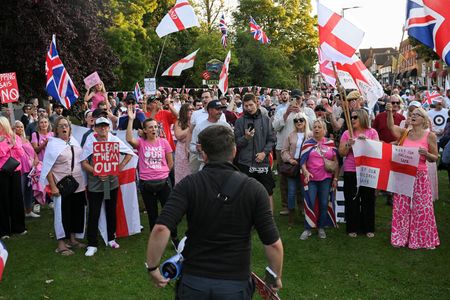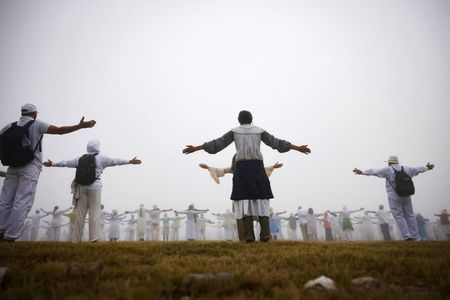LONDON (Reuters) -A British district council on Tuesday won its bid to have asylum seekers temporarily removed from a hotel that has become the focal point for protests after a resident was charged with sexual assault.
Epping Forest District Council took legal action to stop asylum seekers from being housed in the Bell Hotel in Epping, in the county of Essex, about 20 miles (32.19 km) north of London.
Anti-immigration protesters and pro-immigration groups have gathered outside the hotel since an Ethiopian asylum seeker was charged in July with sexual assault and other offences. He has denied the charges and is due to stand trial next week.
Judge Stephen Eyre granted the council an interim injunction against the owner of the hotel, ruling that asylum seekers should be removed by September 12. The hotel’s owner said it would seek to appeal the ruling.
Eyre also dismissed a last-minute attempt on Tuesday by the Home Office, Britain’s interior ministry, to intervene in the case in support of the hotel owner.
The Home Office’s lawyer, Edward Brown, had argued the injunction would have a “substantial impact” on the government’s ability to comply with its legal duty to provide accommodation, describing the hotel as “a key part of national asylum accommodation infrastructure.”
Border Security Minister Angela Eagle said in a statement: “We will continue working with local authorities and communities to address legitimate concerns. Our work continues to close all asylum hotels by the end of this Parliament (2029).”
Hundreds of people have protested outside the Bell Hotel since two asylum seekers were charged over separate incidents, with 16 people also having been charged in relation to what Essex Police described as criminal disorder in Epping.
Care4Calais, a charity supporting asylum seekers and refugees, said some residents have felt frightened and frustrated after being threatened, chased, and had objects thrown at them since the protests in Epping began.
Local police have been on high alert after nationwide rioting last summer, when racist unrest involving far-right supporters broke out after misinformation that the murderer of three girls in Southport was a radical Islamist migrant.
Prime Minister Keir Starmer has pledged to stop thousands of migrants arriving in Britain via small boats, but his government is struggling to do so and faces mounting pressure to show voters he can counter illegal immigration, with support rising for Nigel Farage’s right-wing Reform UK party.
(Reporting by Sam TobinEditing by Rod Nickel)











